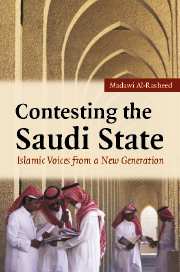Book contents
- Frontmatter
- Contents
- Glossary
- Map
- Introduction: debating religion and politics in the twenty-first century
- 1 Consenting subjects: offcial Wahhabi religio-political discourse
- 2 Re-enchanting politics: Sahwis from contestation to co-optation
- 3 Struggling in the way of God abroad: from localism to transnationalism
- 4 Struggling in the way of God at home: the politics and poetics of jihad
- 5 Debating Salafis: Lewis Atiyat Allah and the jihad obligation
- 6 Searching for the unmediated word of God
- Conclusion
- Notes
- Bibliography
- Index of personal names
- Index of place names
- General Index
- Cambridge Middle East Studies 25
2 - Re-enchanting politics: Sahwis from contestation to co-optation
Published online by Cambridge University Press: 22 September 2009
- Frontmatter
- Contents
- Glossary
- Map
- Introduction: debating religion and politics in the twenty-first century
- 1 Consenting subjects: offcial Wahhabi religio-political discourse
- 2 Re-enchanting politics: Sahwis from contestation to co-optation
- 3 Struggling in the way of God abroad: from localism to transnationalism
- 4 Struggling in the way of God at home: the politics and poetics of jihad
- 5 Debating Salafis: Lewis Atiyat Allah and the jihad obligation
- 6 Searching for the unmediated word of God
- Conclusion
- Notes
- Bibliography
- Index of personal names
- Index of place names
- General Index
- Cambridge Middle East Studies 25
Summary
We, the youth of Islam, were able to dismantle the circle of subservience to the West, reject its deceiving civilisation, know its conspiracies, but so far we do not know the reality of who we are … I am surprised that the vanguards of the Islamic call think that the religion of the people of Sunna and jammaʿa is about theoretical propositions relating to the unknown world rather than about a call for reform and change.
Sheikh Safar al-Hawali, Sharh, p. 9Official Wahhabiyya created consenting subjects. Wealth allowed the Saudi regime to consolidate aspects of religion in the public sphere while pursuing gradual but determined political secularisation. Saudi society and the public sphere were ‘Islamised’ while politics and the modern state remained an autonomous field beyond the reach of most senior religiousscholars. Official ʿulama developed a discourse that sanctioned thisschism. The Wahhabi tradition described in the last chapter ensured that politics remained in the hands of those who claim to know people's interest. The guiding principle was – and still is – ʿal-hukam aʿlam bi almaslaha' (the rulers know the public good). Official Wahhabi scholars removed not only themselves but the rest of society from political matters. They prohibited engagement in public affairs. Their religious discourse, especially that which confirmed the potential corruption and blasphemyof the umma, reinforced the marginalisation of the public and their exclusion from the political decision-making process. Under the banner of the state, official Wahhabiyya refined and consolidated a religious discourse that disenfranchised society and disenchanted politics.
- Type
- Chapter
- Information
- Contesting the Saudi StateIslamic Voices from a New Generation, pp. 59 - 101Publisher: Cambridge University PressPrint publication year: 2006



